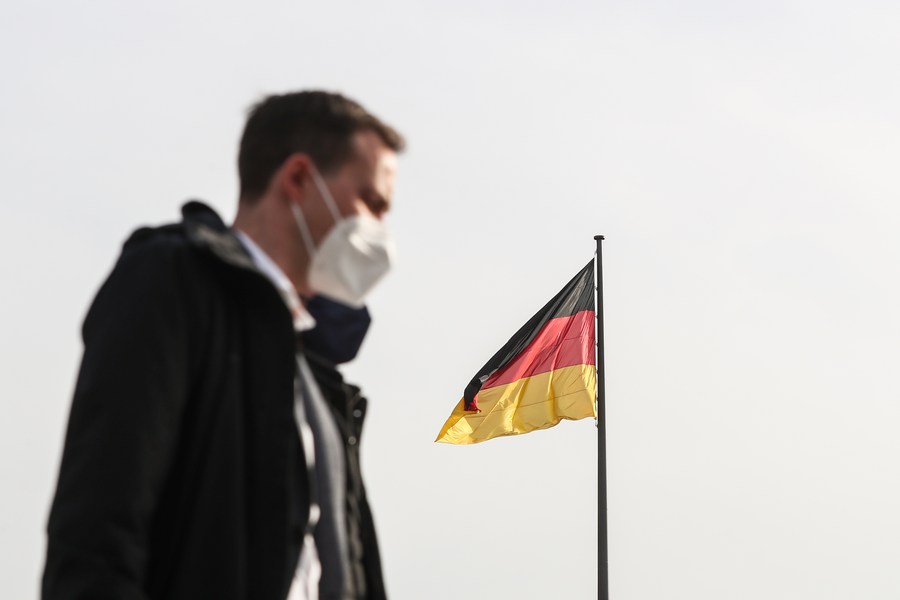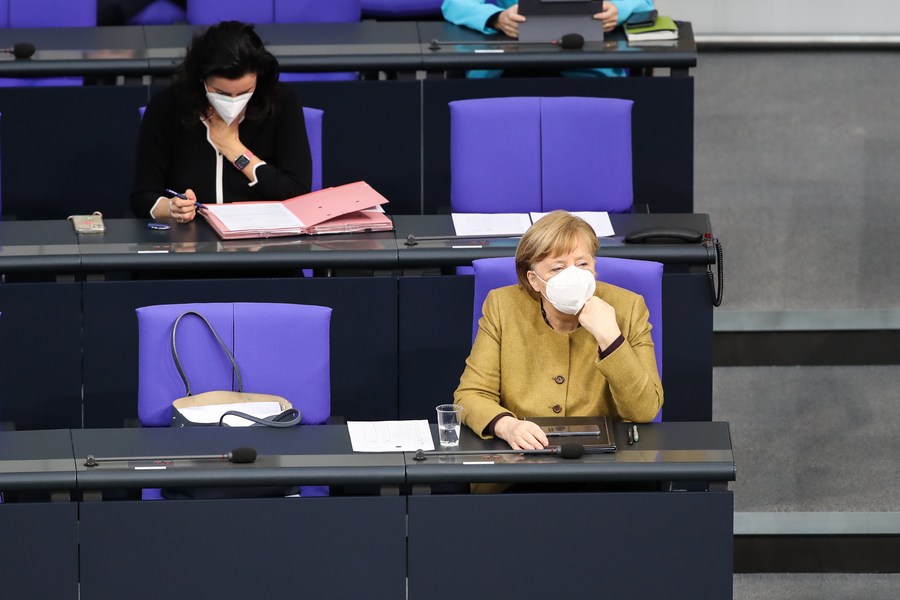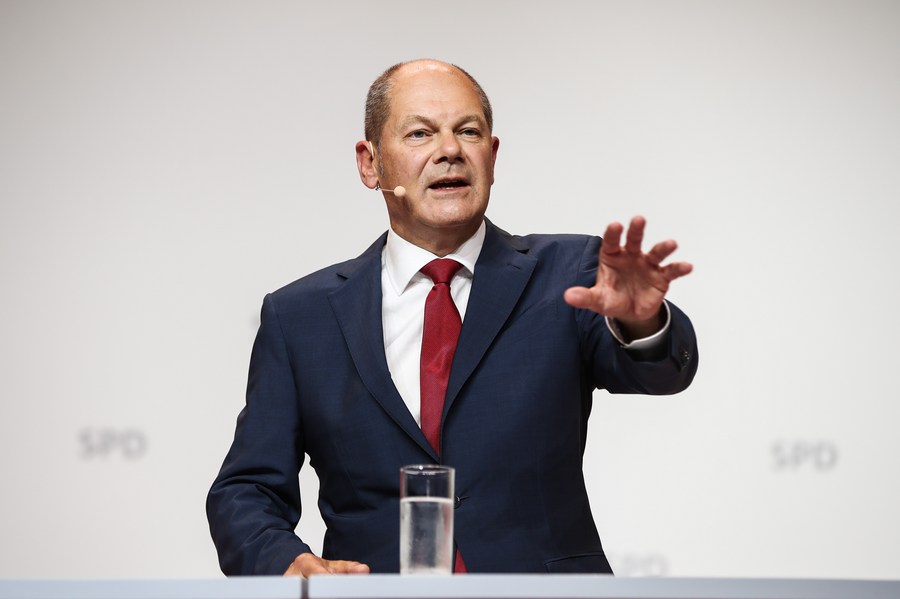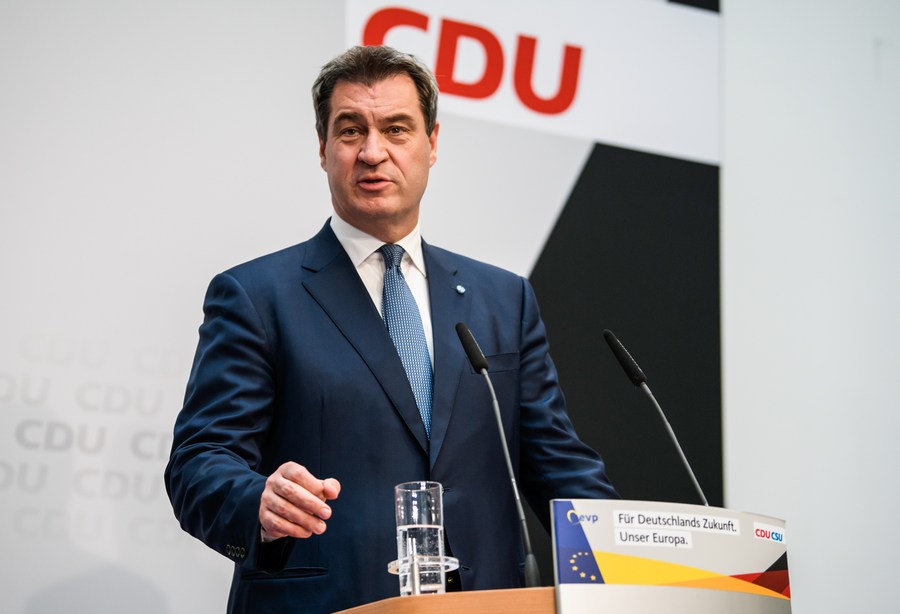


A pedestrian wearing face mask walks past a German national flag in Berlin, Germany, March 3, 2021. (Xinhua/Shan Yuqi)
Merkel's governing CDU/CSU conservative union is currently looking at 33 percent of votes and would thus confirm its role as Germany's largest party after the upcoming federal election. Coalition partner SPD would only reach 16 percent, according to the latest Deutschlandtrend poll by Infratest dimap on behalf of public broadcaster ARD.
A renewed CDU/CSU chancellorship seems inevitable at the moment, most likely in coalition with the Green party, which has repeatedly emphasized its claim to be part of the next government. The two parties together would receive a necessary majority of 53 percent.
BERLIN, March 5 (Xinhua) -- German media has dubbed 2021 "the super election year," as politicians and voters in Germany are preparing for an election in September which might change the country's political landscape more than any of the previous ones.
Whatever the outcome, Germany will have a new chancellor. Chancellor Angela Merkel of the Christian Democratic Union (CDU) had announced in 2018 that she would not run for office again after four consecutive terms.
Being in office for 16 years, Merkel will be one of the longest-serving chancellors -- on a par with Helmut Kohl, who led Germany into reunification in 1990.
Traditionally, only the Social Democratic Party (SPD) has challenged the CDU's claim to the chancellorship. However, the SPD has been continually losing ground in the last national elections and even lost its position as Germany's second-largest political power to the Green Party.
The Greens' upswing is inextricably linked to the SPD's poor election results as illustrated by the 2019 European Parliament elections. Most people who changed their vote to the Greens were former SPD supporters.

German Chancellor Angela Merkel (R) sits on chair with a face mask after giving a speech on measures to contain the COVID-19 pandemic to Germany's Federal Parliament (Bundestag) in Berlin, capital of Germany, Feb. 11, 2021. (Xinhua/Shan Yuqi)
POLLS POINT TO NEW GOV'T COALITION WITH GREENS
Merkel's governing conservative union, consisting of CDU and Christian Social Union in Bavaria (CSU), is currently looking at 33 percent of votes and would thus confirm its role as Germany's largest party after the upcoming federal election. Coalition partner SPD would only reach 16 percent, according to the latest Deutschlandtrend poll by Infratest dimap on behalf of public broadcaster ARD.
However, as the senior coalition partner in the current government, the CDU/CSU position is anything but secure until the election. Its handling of the COVID-19 crisis, in particular, could be a stumbling block on the road to the federal election. With every day that the ongoing lockdown determines people's lives, criticism in Germany is getting louder.
"Although there is still a majority in favor of the federal government's COVID-19 strategy, a growing number of people are starting to question whether it is adequate," Michael Mertes, a polling expert at Infratest dimap, told Xinhua on Friday, warning that this could cause further voter migration to parties outside the wider political center or to the non-voter camp.
The Greens won 20 percent of votes in the latest Deutschlandtrend survey, more than double the votes they garnered in the 2017 federal election. Growing public concern for environmental issues and climate change, particularly among younger Germans, is clearly reflected in the polls.
A renewed CDU/CSU chancellorship seems inevitable at the moment, most likely in coalition with the Green party, which has repeatedly emphasized its claim to be part of the next government. The two parties together would receive a necessary majority of 53 percent.

German Vice Chancellor and Finance Minister Olaf Scholz attends a press conference in Berlin, capital of Germany, Aug. 10, 2020. German Social Democratic Party (SPD) proposed Olaf Scholz as candidate for Chancellor at the upcoming election in 2021. (Xinhua/Shan Yuqi)
A GREEN GERMAN CHANCELLOR?
"It's about making the unimaginable possible, even as an underdog," Annalena Baerbock, one of the two Green Party leaders, said recently. Winfried Kretschmann, Green minister-president of the state of Baden-Wuerttemberg, even expressed higher aspirations. "We want to provide the chancellor ourselves," Kretschmann told the newspaper Der Tagesspiegel (The Daily Mirror).
The so-called grand coalition between the CDU/CSU and SPD is not forecasted to get enough votes to continue. Perhaps even more importantly, the junior partner SPD made clear that it's not looking for an extension of the coalition.
"No one wants a continuation of the current coalition after 2021, not the people, not the CDU/CSU -- and we Social Democrats certainly don't want one," stressed SPD party leader and the country's Finance Minister Olaf Scholz way back in 2019.
The CDU/CSU has not yet decided who will run for chancellor. If German voters had their way, Markus Soeder, minister-president of Bavaria and head of the CSU, would win the race against CDU leader Armin Laschet.
More than half of German voters deem Soeder the most suitable candidate for chancellor, according to a recent survey by Politbarometer on behalf of public broadcaster ZDF. Soeder's firm stance during the COVID-19 crisis in Germany has won him much public support.

File photo taken on May 26, 2019 shows Christian Social Union (CSU) leader Markus Soeder attending a press conference at the headquarters of the Christian Democratic Union (CDU) in Berlin, capital of Germany (Xinhua/Kevin Voigt)

 Award-winning photos show poverty reduction achievements in NE China's Jilin province
Award-winning photos show poverty reduction achievements in NE China's Jilin province People dance to greet advent of New Year in Ameiqituo Town, Guizhou
People dance to greet advent of New Year in Ameiqituo Town, Guizhou Fire brigade in Shanghai holds group wedding
Fire brigade in Shanghai holds group wedding Tourists enjoy ice sculptures in Datan Town, north China
Tourists enjoy ice sculptures in Datan Town, north China Sunset scenery of Dayan Pagoda in Xi'an
Sunset scenery of Dayan Pagoda in Xi'an Tourists have fun at scenic spot in Nanlong Town, NW China
Tourists have fun at scenic spot in Nanlong Town, NW China Harbin attracts tourists by making best use of ice in winter
Harbin attracts tourists by making best use of ice in winter In pics: FIS Alpine Ski Women's World Cup Slalom
In pics: FIS Alpine Ski Women's World Cup Slalom Black-necked cranes rest at reservoir in Lhunzhub County, Lhasa
Black-necked cranes rest at reservoir in Lhunzhub County, Lhasa China's FAST telescope will be available to foreign scientists in April
China's FAST telescope will be available to foreign scientists in April